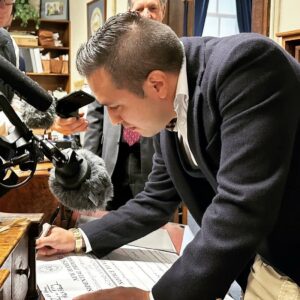Former President Donald Trump’s campaign staff can rest easy now that Judge Joseph LaPlante dismissed tax attorney John Castro’s federal lawsuit to block Trump from the ballot.
Castro, who on paper is a Republican presidential candidate, was trying to force the New Hampshire Secretary of State’s Office to disqualify Trump under the 14th Amendment. But LaPlante ruled Friday that Castro’s legal arguments and constitutional theories did not pass muster. Specifically, Castro could not prove that his obscure presidential campaign was harmed in any meaningful way by Trump’s.
“Castro makes no attempt to demonstrate that he is actually competing with Trump for votes and contributions, as required under the operative competitor standing theory. The evidence shows that Castro has not campaigned in New Hampshire or elsewhere. Castro has not provided any evidence suggesting that he has voters or contributors in New Hampshire or elsewhere, or that he will benefit from voter or contributor defections from Trump to himself. To the contrary, he acknowledges that he will not win any delegates in the primary,” LaPlante wrote in his order to dismiss.
Richard Lehmann, the New Hampshire attorney representing Trump, said Castro’s argument was hurt by his complete lack of evidence. However, Castro didn’t have much choice in bringing evidence, Lehmann said.
“(T)here was no evidence he could have presented,” Lehmann told NHJournal. “He admitted that the purpose of his candidacy was to get around existing case law that says voters do not have standing to challenge the qualifications of presidential candidates. The judge ruled that cutting a check to the New Hampshire Secretary of State and calling yourself a candidate, despite the complete absence of an actual campaign, did not confer standing, either.”
Castro has filed 27 federal lawsuits aimed at keeping Trump off the ballot because of Trump’s actions surrounding the Jan. 6, 2021, riot at the U.S. Capitol. Castro argues the former president cannot serve another term due to the 14th Amendment’s clause barring insurrectionists from holding office.
Castro’s earlier attempts to stop Trump were rejected by courts that ruled he had no standing to bring his lawsuits. Castro’s novel solution was to create a presidential campaign to establish the necessary standing.
In courts, standing is the legal requirement that the party bringing a complaint must be able to prove they suffered specific harm from the actions of the opposing party. Castro filed nomination paperwork in key swing states, including New Hampshire. In his 27 federal lawsuits, Castro says Trump is holding back his presidential run.
LaPlante called that argument weak and speculative. Castro claimed that if Trump were not running, at least some Trump voters and donors would back him instead. Castro relied on no evidence to back this claim during last week’s evidentiary hearing in the United States District Court in Concord, telling LaPlante that “the math” proves someone would switch to his campaign without Trump in the race. LaPlante was not convinced.
“An injury based on speculation about the decisions of independent actors does not confer standing,” LaPlante wrote.
Possibly fatal for Castro’s efforts going forward is LaPlante’s opinion that even if he were a serious presidential candidate and could prove standing, it wouldn’t matter. Courts cannot bar people from running for office under the 14th Amendment, LaPlante wrote, or any other constitutional provision. That power belongs to Congress.
“In sum, the vast weight of authority has held that the Constitution commits to Congress and the electors the responsibility of determining matters of presidential candidates’ qualifications,” LaPlante wrote.
Castro’s failure in New Hampshire will unlikely cause this political gadfly to land. He still has dozens more lawsuits in other states and a history as a perennial candidate.
After running for state offices in Texas as a Democrat, Castro switched parties in 2020. He made runs for Senate and Congress in Texas as a Republican, though he barely registered in the final results in either campaign.
Castro has also created quite a legal record outside of politics. In 2018, his $5 million lawsuit against the Georgetown University law school was dismissed. Castro sued his alma mater after he was banned from the Georgetown hiring fair, both as a prospective employee and employer.
His ban was a result of resume inflation, according to court records. Castro claimed to have been a West Point cadet, though, in fact, he attended a prep school for cadet candidates who had not yet academically qualified for the service academy.
Last year, Castro’s client Alan Dixon, CEO of now failed Australian financial firm Dixon Advisory, lost his refund appeal case with the IRS. Dixon relied on Castro and his novel interpretation of tax law to refile two years of tax returns to shield his American revenue from American taxes.
Castro refiled the Dixon tax returns for 2013 and 2015 and sought $3.2 million in refunds. Instead of getting a giant check from the IRS, Dixon ended up audited. It turns out Castro signed the tax returns for Dixon without any legal power of attorney, according to court records.
Dixon ended up with a bigger tax bill, and his company imploded around the same time, costing thousands of Australians their retirement funds.




